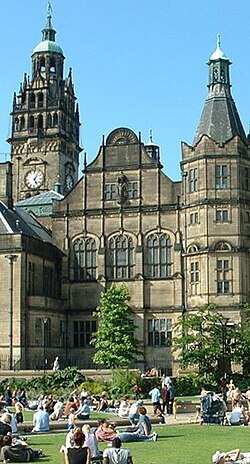Sheffield Town Hall
| Sheffield Town Hall | |
|---|---|

Sheffield Town Hall & Peace Gardens
|
|
| Record height | |
| Tallest in Sheffield from 1896 to 1965 | |
| Preceded by | Cathedral Church of St Marie |
| Surpassed by | Arts Tower |
| General information | |
| Status | Complete |
| Type | Government |
| Location | Sheffield, South Yorkshire, England |
| Coordinates | 53°22′49″N 1°28′10″W / 53.3803398°N 1.4694321°WCoordinates: 53°22′49″N 1°28′10″W / 53.3803398°N 1.4694321°W |
| Completed | 1896 |
| Opening | 1896 |
| Owner | Sheffield City Council |
| Height | |
| Roof | 61 m (200 ft) |
| Top floor | 61 m (200 ft) |
| Technical details | |
| Floor count | 6 |
Sheffield Town Hall is a building in the City of Sheffield, England. The building is used by Sheffield City Council, and also contains a publicly displayed collection of silverware. The current building, Sheffield's fourth town hall, is located on Pinstone Street. It was designed by the London-based architect E. W. Mountford and constructed over a seven-year period from 1890 to 1897, opening on 21 May 1897. An extension designed by F. E. P. Edwards was completed in 1923.
The design of the exterior echoed to a certain extent the architecture of the adjacent St. Paul's Church of 1720 (now demolished). During construction, the building was criticised for its expensive embellishments. The exterior is built of Stoke stone from the Stoke Hall Quarry in Grindleford, Derbyshire and is decorated with carvings by F. W. Pomeroy. The friezes depict the industries of Sheffield, and the 64 metre high clock-tower is surmounted by a statue of Vulcan. Bells were never installed in the clock-tower, but in 2002 an electronic bell sound system was added to provide hourly strikes and Westminster-style quarter chimes.
The building was opened by Queen Victoria, using a remote control lock from her carriage. The turning of the key in the lock triggered a light in the building which was the signal for three concealed men to open the gates.
The entry contains displays relating to HMS Sheffield and leads to the Main Entrance Hall with a grand marble staircase. This also has an Electrolier an electric chandelier, part of the original lighting of the building. The walls include friezes including a depiction of the slaying of the Dragon of Wharncliffe. On the first landing is a statue of the first Lord Mayor Henry Fitzalan-Howard, 15th Duke of Norfolk.
...
Wikipedia
